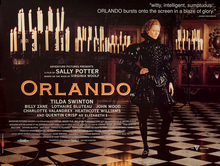| Orlando | |
|---|---|
 UK theatrical release poster | |
| Directed by | Sally Potter |
| Screenplay by | Sally Potter |
| Based on | Orlando: A Biography by Virginia Woolf |
| Produced by | Christopher Sheppard |
| Starring | |
| Cinematography | Aleksei Rodionov |
| Edited by | Hervé Schneid |
| Music by |
|
Production companies |
|
| Distributed by |
|
Release dates |
|
Running time | 93 minutes |
| Countries |
|
| Language | English |
| Budget | $4 million [4] |
| Box office | $13 million [5] |
Orlando is a 1992 fantasy drama film [6] loosely based on Virginia Woolf's 1928 novel Orlando: A Biography , starring Tilda Swinton as Orlando, Billy Zane as Marmaduke Bonthrop Shelmerdine, and Quentin Crisp as Queen Elizabeth I. It was written and directed by Sally Potter, who also co-wrote the score with David Motion. [7] The film is an international co-production of the United Kingdom, France, Italy, the Netherlands and Russia. [8]
Contents
- Plot
- Differences from the novel
- Cast
- Production
- Poetry
- Music
- Reception
- Box office
- Critical response
- Accolades
- Orlando: The Queer Element
- 2020 Met Gala inspiration
- Notes
- References
- Further reading
- External links
Critics praised the film and particularly applauded its visual treatment of the settings of Woolf's novel. The film premiered in competition at the 49th Venice International Film Festival, [9] and was re-released in select US cinemas on 23 July 2010. [10] [11]
